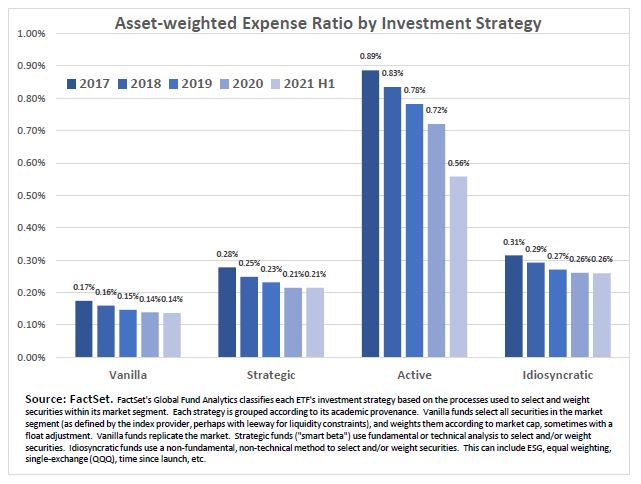By Solomon G. Teller, CFA, Chief Investment Strategist

For the past few years, ETF management fees have been on the decline. My friend Elisabeth Kashner at Factset recently showed that ETF holding costs across all major strategies, including actively managed, have been steadily falling – see chart.
For instance, fees on Strategic ETFs, also known as “smart beta”, fell 25% from an asset weighted average of 0.28% to 0.21%. These declines are good news for ETF investors as falling ownership costs along with ETFs’ tax efficiency only improve the attractiveness of using ETFs as building blocks for improving after-tax returns. After all, what matters is not just what you make but what you keep.
Disclaimers:
Performance quoted represents past performance, which is no guarantee of future results. Investment return and principal value will fluctuate, so you may have a gain or loss when the portfolio is liquidated. Current performance may be higher or lower than that quoted. Performance of an index is not illustrative of any particular investment and does not include the impact of advisory fees. It is not possible to invest directly in an index.
GHAM does not provide tax advice and does not employ a Certified Public Accountant on its staff. We work with outside accounting firms and tax counsel that provide guidance and updates on relevant tax law, and we have reviewed the tax treatment of our transaction structures with those professional advisors. Based on those reviews, GHAM is satisfied that our structures support the desired tax results, but we urge clients to consult their own legal and tax advisors regarding the tax treatment of the transactions effected in their GHAM account. Such transactions include ETFs. Federal, state and local tax laws are subject to change. GHAM is not responsible for providing clients updates on any changes in tax laws, rules or statutes. Clients remain fully responsible for their own tax positions. Although GHAM does not provide tax, legal or accounting advice, we stand ready to assist clients and their advisors in reviewing the relevant tax rules.
Reasons to harvest capital losses, sources of capital gains and the suggestion that mutual funds distribute capital gains are for illustrative purposes only. The availability of tax alpha is highly dependent upon the initial date and time of investment as well as market direction and security volatility during the investment period. Tax loss harvesting outcomes may vary greatly for clients who invest on different days, weeks, months and all other time periods. A client’s tax alpha will depend on the client’s individual circumstances, which are outside of GHAM’s knowledge and control.
All performance and tax benefit capture figures are derived from data provided from multiple third-party sources. All estimates were created with the benefit of hindsight and may not be achieved in a live account. The data received by GHAM is unaudited and its reliability and accuracy is not guaranteed.
This material is not intended to be relied upon as legal, investment or tax advice in any form or for any specific client. The information provided does not take into account the specific objectives, financial situation or particular needs of any specific person. All investments carry a certain degree of risk, and there is no assurance that an investment will perform as expected over any period of time.
As a convenience to our readers, this document may contain links to information created and maintained by third party sites. Please note that we do not endorse any linked sites or their content, and we are not responsible for the accuracy, timeliness or even the continued availability or existence of this outside information. While we endeavor to provide links only to those sites that are reputable and safe, we cannot be held responsible for the information, products or services obtained from such other sites and will not be liable for any damages arising from your access to such sites.

